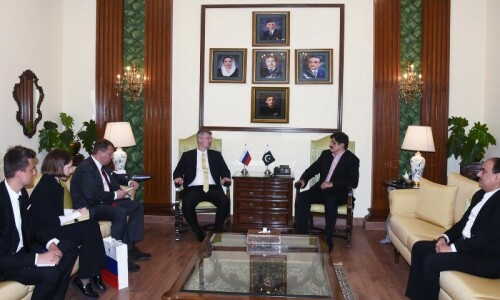KARACHI: Following the disintegration of the Soviet Union, the Central Asian states of Tajikistan, Turkmenistan, Uzbekistan, Kyrgyzstan, and Kazakhstan have acquired a renewed importance in the regional and international politics in the last three and a half decades.
This was observed by renowned historian Prof Dr Syed Jaffar Ahmed at an international conference on ‘Central Asia in the Changing World’ organised on Tuesday by the Department of History, University of Karachi, and the Institute of Central and West Asian Studies.
Its venue was Jinnah Auditorium of the Dr. A.Q. Khan Institute of Biotechnology and Genetic Engineering.
Dr Jaffar said those states, along with certain others, after acquiring independence, renegotiated their affairs among themselves and with the rest of the world.
The honorary secretary of Pakistan Institute of International Affairs, Prof Dr Tanveer Khalid, shared that the Central Asia was going through a shifting of the balance of power both globally and within the wider region, changing the external dynamics and bringing about new opportunities as well as new pressures.
Dr Tanveer observed that the Central Asia served as a launch pad for the US involvement in Afghanistan and its withdrawal led the public to perceive it as a transient foreign power.
Economist Dr Kaiser Bengali mentioned that Pakistan and the Central Asian countries always gave importance to economic interests to benefit their national interests. He said majority of Pakistanis believed that Muslim governments around their neighbour and in a region would benefit the country, which was just a misconception as the establishment of economic ties with other nations demanded certain policies, practices and governance.
He said Pakistan had to come up with a better approach to enhance economic and strategic relations in the world besides improving educational standards to meet the global requirement.
KU Vice Chancellor Prof Dr Khalid Mahmood Iraqi said that economic strength was vital for maintaining relations with other countries.
He mentioned that it was a critical time to understand the new emerging threats on the political horizon internationally.
He observed that from the Eurasian mountain down to the coastal belt of Pakistan, borders with two powerful and important players of international diplomacy —China and Russia — had tremendous potential to form an economic union like the European Union.
Others who also spoke on the occasion included KU’s Dean of the Faculty of Arts and Social Sciences Prof Dr Shaista Tabassum, Dr Hina Khan, Prof Dr Nasreen Afzal and Prof Dr S.M. Taha.
Published in Dawn, October 16th, 2024











































Dear visitor, the comments section is undergoing an overhaul and will return soon.